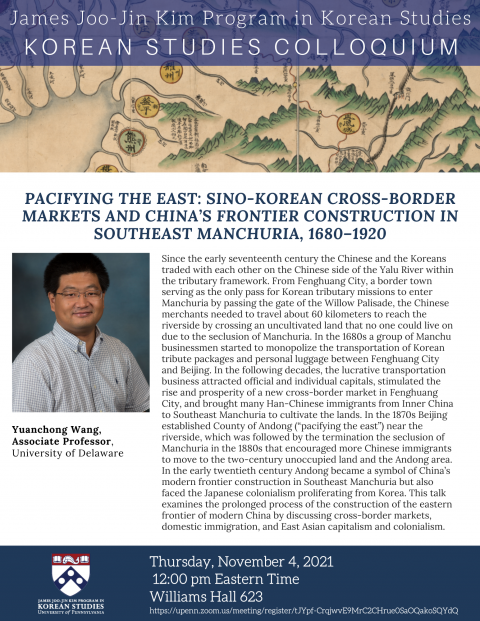
Korean Studies Colloquium
Williams Hall 623
Optional Zoom registration HERE
Since the early seventeenth century the Chinese and the Koreans traded with each other on the Chinese side of the Yalu River within the tributary framework. From Fenghuang City, a border town serving as the only pass for Korean tributary missions to enter Manchuria by passing the gate of the Willow Palisade, the Chinese merchants needed to travel about 60 kilometers to reach the riverside by crossing an uncultivated land that no one could live on due to the seclusion of Manchuria. In the 1680s a group of Manchu businessmen started to monopolize the transportation of Korean tribute packages and personal luggage between Fenghuang City and Beijing. In the following decades, the lucrative transportation business attracted official and individual capitals, stimulated the rise and prosperity of a new cross-border market in Fenghuang City, and brought many Han-Chinese immigrants from Inner China to Southeast Manchuria to cultivate the lands. In the 1870s Beijing established County of Andong (“pacifying the east”) near the riverside, which was followed by the termination the seclusion of Manchuria in the 1880s that encouraged more Chinese immigrants to move to the two-century unoccupied land and the Andong area. In the early twentieth century Andong became a symbol of China’s modern frontier construction in Southeast Manchuria but also faced the Japanese colonialism proliferating from Korea. This talk examines the prolonged process of the construction of the eastern frontier of modern China by discussing cross-border markets, domestic immigration, and East Asian capitalism and colonialism.
Yuanchong Wang is Associate Professor in the Department of History at the University of Delaware. He specializes in late imperial and modern Chinese and East Asian history. His publication includes Remaking the Chinese Empire: Manchu-Korean Relations, 1616–1911 (Cornell, 2018) and Zhong Mei Xiangyu: Daguo waijiao yu Wanqing xingshuai, 1784–1911 [The meeting of China and the United States: Power diplomacy and the rise and fall of Late Qing, 1784–1911] (Wenhui, 2021). His current research project examines time, calendar, and empire-building/state-building in modern China.
 James Joo-Jin Kim Center for Korean Studies
James Joo-Jin Kim Center for Korean Studies